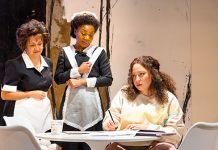By Joan Ellis
It is likely that you will leave your own life behind and simply disappear into The Other Son. This is a story brought to deeply moving life by a flawless cast, an economy of words, and inspired direction by French writer/director Lorraine Levy. In other words, just go.
We are led slowly into this story of two families by a director whose pace wraps us in suspense without indulging in melodrama. If the background of the Arab/Israeli conflict is familiar, the emotions raised here are neither indigenous nor partisan, but universal. They strike with the force of a blow.

Orith Silberg (Emmanuelle Devos) has just been told by her doctor that blood testing has shown that her son Joseph (Jules Sitruk) is not her son. Heartsick, she tells her husband Alon (Pascal Elbe) who reacts with a mixture of silence and rage. The doctor learns that 18 years earlier, Joseph and Yacine Al Bezaaz (Areen Omari) were incubator babies born in the same hospital during the war and then evacuated for their safety. A nurse returned the wrong newborn to each mother.
The doctor summons the Silbergs and the Al Bezaaz family to his office. It is at this moment that we are awed by the two mothers, Orith and Leila (Areen Omari), as they move into an emotional space that transcends the anger that consumes their husbands. The massive dilemma is a proven truth, but each woman reacts to her own inner turmoil with a quiet and positive dignity that is inspiring.
The shock of learning that the sons they have adored for 18 years are not their sons is an electric charge because of the hatred between the Palestinians and Israelis. The two boys understand that each has become the enemy.
“You mean I’m the other one? And the other one is me?” Yes, and which of them is Jewish, which is Palestinian? Confirming the religious complications, the rabbi tells Joseph he is no longer Jewish because religion is conferred by the biological mother. It is hard to exaggerate the conflicting cultural and religious extremes. And from Joseph, “Being Jewish was important. Now it’s as if I didn’t exist.”
Parents and sons begin to navigate the new complexities of their lives as enemies living across a guarded border from each other. We see the depth of the maternal drive that enables grace. We watch the resilience and strength of youth of two young men grappling with their own reactions as well as those of their parents.
I will leave it to the rest of you to decipher the difference between the reactions of the fathers and those of the mothers. It’s male, and it’s ego, and I don’t understand it.
Just know that the remarkable cast will draw you in so deeply that you will be living their lives. Lorraine Levy lets silence and the expressions of her actors convey emotions that most of us can’t imagine. As I said earlier, please go.
Rated PG-13
Joan Ellis’ address on the Internet, which contains her review library, is JoanEllis.com.














